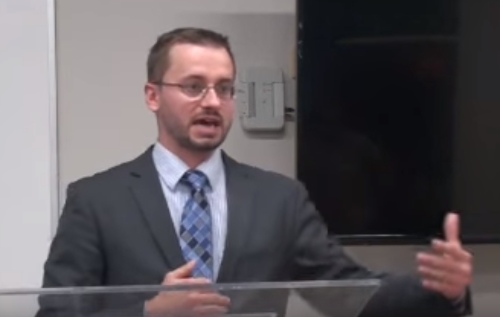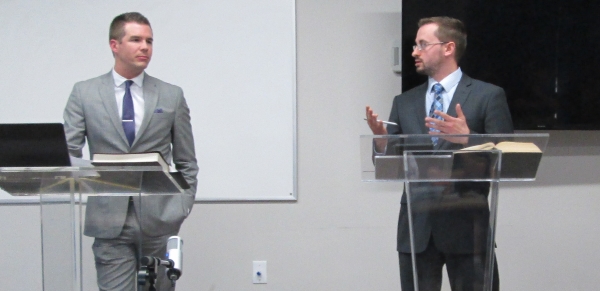Podcast: Play in new window | Download
Subscribe: Spotify | Email | RSS
 Does the New Testament teach that Jesus existed before his human career? Or does it teach that Jesus came into existence at some point no earlier than his miraculous conception in Mary?
Does the New Testament teach that Jesus existed before his human career? Or does it teach that Jesus came into existence at some point no earlier than his miraculous conception in Mary?
This question was recently debated at length between David Barron and Dr. Dustin Smith, at an event hosted by Atlanta Bible College. In this episode I discuss this debate with Mr. Barron, who argued the “Pro” side in the debate, that the New Testament teaches that Jesus had a lengthy pre-human career.
The first portion of our talk deals with wider issues, giving you more insight into Mr. Barron’s theology and christology before you view the debate. The second portion is designed more for those who’ve seen the debate. You can watch the entire debate below.
You can now also subscribe to the trinities podcast through Google Play Music. For other ways to subscribe, see here.
Links for this episode:
- scripturaltruths.com
- David Barron vs. Dr. Dustin Smith – Debate on Jesus’ Preexistence
- a few of Mr. Barron’s previous debates
- scripturaltruths YouTube channel

- Dr. Dustin Smith’s Dustin Martyr blog
- podcast 30 – The Council of Nicea
- “Incarnation” by Dr. David Werther
- Do the Gospels disagree about Jesus and God? Part 1 – Three Options (Part 2)
- Biblical texts discussed in this episode: 1 Corinthians 10:1-13; Jude 5; Genesis 1:26-27; Genesis 19:24-25; John 1; John 8:58; John 17:5; Matthew 23:37.
- This week’s thinking music is “Future Journeys (Sweet Memories Mix)“ by Ars Sonor.


For anyone whose interested. Here’s a little review I wrote on the debate, obviously in the light that I side With David Barron here:
https://theologyandjustice.wordpress.com/2016/04/19/clash-of-the-heretics/
Roman,
Thanks for posting your review of the debate.
I think David Barron made some good points from John 3 about the implications of taking the “from above” and “come down from heaven” language very literally. However, Dustin Smith also did a good job of demonstrating the implications of taking the more abundant genealogical language very literally. Neither one of them adequately accounted for all of the exegetical evidence that wasn’t consistent with their respective views.
This is the reason that the dialogue between the opposing perspectives must continue. The best theory of Christology is going to be able to give a coherent and comprehensive explanation that accounts for all of the evidence.
I appreciate that David Barron exposed the weaknesses of some of the Socinian arguments, but I didn’t find his defense of the “preexisting spirit being” idea any more substantial. It just seems to boil down to what particular approach one takes with respect to a handful of controversial passages in the 4th Gospel. That’s where the work still needs to be done.
Dale, about minute 08:25 of podcast 135, you ask David Barron: “Speaking of the Nicene Creed, it makes a big point of asserting there was no time when the Son was not … is that also a thing that you defend? Do you defend pre-existence by something like eternal generation?”
The concept of “eternal generation” can be ascribed back to Origen (although he never formulated it as such, but rather by affirming that “There was not when he was not”). It is far from obvious that the original Nicene Creed (325) affirmed the personal pre-existence, nay, eternity of Jesus Christ, the Son of God.
Perhaps you are not aware that the phrase before all worlds (æons) was added to the original Nicene Creed at Constantinople (381), so as to seal the compromise between the “Nicene” and the “semi-Arians”, brokered by the Cappadocian scoundrels.
Perhaps you would be even more surprised to hear that the “before all ages” infamous clause first appeared where one would never expect to see it, in Arius’ own letter to Constantine in 327 (Arius’ Letter to the Emperor Constantine, 327 CE, from: Sozomen, Ecclesiastical History, 2, 27. NPNF, ser. 2, vol. 2, 277, http://ecole.evansville.edu/arians/arius3.htm ), a “creed” hastily compiled by Arius and his crony, deacon and supporter Euzoïus, apparently along the lines of the Nicene Creed of 325, which easily procured for them the return from exile and the return to the favor of Emperor Constantine. Which, BTW, should prove how irrelevant was the Nicene Creed, however phrased, for the purpose for which it was officially defined: the definitive quashing of the Arian heresy.
This was a good debate.
Even though I don’t agree with the overall conclusions that David Barron draws about Preexistence, I think he made some very good arguments from the grammar and the context of John 3 that should cause all of us Biblical Unitarians to reconsider how we are trying to explain our perspective on the “coming down from heaven” passages.
I also agree with some of Barron’s comments about “the word” in John 1. Even though I don’t think Preexistence or Incarnation is a necessary inference from any of the language in the Prologue, I do think Barron made some good points about the difficulty of making “the word” an “impersonal” concept in John 1.
Rivers
If David actually made the follow statement – “I also really like what David said in this podcast about objectivity and the importance of being careful to allow the more ambiguous texts to speak in their own terms rather than forcing them to fit doctrinal presuppositions.” – painfully ironic – in light of his desperate grasp of highly ambiguous texts in John – in contrast to the so many clear texts re Jesus being a man conceived by a woman with NO sense of any sort of personal pre-incarnate state throughout say any sermon in Acts – at a time when we would expect Jesus to be clearly informed.
Greg
Greg,
In fairness to David Barron, he was focussing on the difficult texts in John 3 during the debate (which are part of the evidence the Biblical Unitarians need to be able to explain). Of course, I agree with you that there are many texts that would be problematic for David’s view as well. I wish the debate with Dr. Smith could have covered more of those passages.
I don’t think the apostles were teaching any notion of Preexistence or Incarnation. However, a good theory of Christology still needs to be able to account for the “descending from heaven” language in the 4th Gospel. I think David did a good job of pointing out why some of the superficial attempts to dismiss the implications of that language are not adequate or reasonable.
Your statement below reflected my observation – that Jn3 needed a stronger approach (to be honest, I was not sure why it was so hard). Barron and I went head to head on Jn1:10 – I do appreciate the fact that this vs exists – I could provide a standard explanation – HOWEVER, I remain unconvinced that we have a clear Biblically based explanation in any sense. Barron took my lack of comfort with having a clear, Biblically based exegesis of any sense – to be an abject failure and total denigration of the ultimate conclusion. I was disappointed in his lack of a more considered thought process here.
“I think David did a good job of pointing out why some of the superficial attempts to dismiss the implications of that language are not adequate or reasonable.”
Regardless, I think Jn3 and Jn1:10 are both worthy of continuing to meditate in order to provide not just standard BU responses – which seem intuitively obvious in light of the counsel of God taken as a whole – but specific, clear, concise exegesis re the type of speech contained within both. Admittedly, I am reticent to spend the Lord’s good time on helping people with ambiguous texts in light of the very clear texts when when there is a reasonable general explanation available that conforms to the clear text (my standard hermeneutic).
Greg.
Please explain how you would interpret John 1:10. I don’t think I’m familiar with your conversations with David Barron on that passage.
Comments are closed.